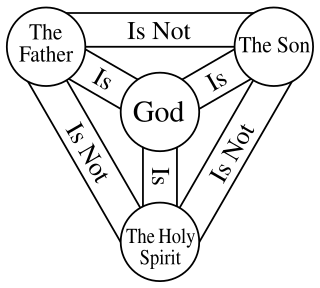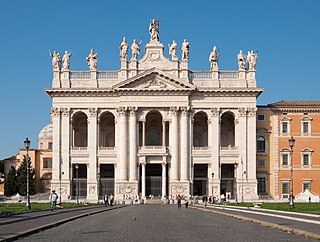Related Research Articles
Natural theology, once also termed physico-theology, is a type of theology that seeks to provide arguments for theological topics based on reason and the discoveries of science, the project of arguing for the existence of God on the basis of observed natural facts, and through natural phenomena viewed as divine, or complexities of nature seen as evidence of a divine plan or Will of God, which includes nature itself.
Process theology is a type of theology developed from Alfred North Whitehead's (1861–1947) process philosophy, but most notably by Charles Hartshorne (1897–2000), John B. Cobb, and Eugene H. Peters (1929-1983). Process theology and process philosophy are collectively referred to as "process thought".

In the philosophy of religion, a theodicy is an argument that attempts to resolve the problem of evil that arises when omnipotence, omnibenevolence, and omniscience are all simultaneously ascribed to God. Unlike a defence, which merely tries to demonstrate that the coexistence of God and evil is logically possible, a theodicy additionally provides a framework wherein God's existence is considered plausible. The German philosopher and mathematician Gottfried Leibniz coined the term "theodicy" in 1710 in his work Théodicée, though numerous attempts to resolve the problem of evil had previously been proposed. The British philosopher John Hick traced the history of moral theodicy in his 1966 work Evil and the God of Love, identifying three major traditions:
- the Plotinian theodicy, named after Plotinus
- the Augustinian theodicy, which Hick based on the writings of Augustine of Hippo
- the Irenaean theodicy, which Hick developed, based on the thinking of St. Irenaeus

The Christian doctrine of the Trinity is the central doctrine concerning the nature of God in most Christian churches, which defines one God existing in three coequal, coeternal, consubstantial divine persons: God the Father, God the Son and God the Holy Spirit, three distinct persons (hypostases) sharing one essence/substance/nature (homoousion). As the Fourth Lateran Council declared, it is the Father who begets, the Son who is begotten, and the Holy Spirit who proceeds. In this context, one essence/nature defines what God is, while the three persons define who God is. This expresses at once their distinction and their indissoluble unity. Thus, the entire process of creation and grace is viewed as a single shared action of the three divine persons, in which each person manifests the attributes unique to them in the Trinity, thereby proving that everything comes "from the Father," "through the Son," and "in the Holy Spirit."

In monotheistic theology, the doctrine of Divine Simplicity says that God is simple.
Open theism, also known as openness theology and free will theism, is a theological movement that has developed within Christianity as a rejection of the synthesis of Greek philosophy and Christian theology. Open theism arises out of the free will theistic tradition of the church, which goes back to the early church fathers. Open theism is typically advanced as a biblically motivated and logically consistent theology of human and divine freedom, with an emphasis on what this means for the content of God's foreknowledge and exercise of God's power.

Divine command theory is a meta-ethical theory which proposes that an action's status as morally good is equivalent to whether it is commanded by God. The theory asserts that what is moral is determined by God's commands and that for a person to be moral he is to follow God's commands. Followers of both monotheistic and polytheistic religions in ancient and modern times have often accepted the importance of God's commands in establishing morality.
Impassibility describes the theological doctrine that God does not experience pain or pleasure from the actions of another being. It has often been seen as a consequence of divine aseity, the idea that God is absolutely independent of any other being, i.e., in no way causally dependent. Being affected by the state or actions of another would seem to imply causal dependence.
In Christian theology, divinization, or theopoesis or theosis, is the transforming effect of divine grace, the spirit of God, or the atonement of Christ. Although it literally means to become divine, or to become God, most modern Christian denominations do not interpret the doctrine as implying an overcoming of a fundamental ontological difference between God and humanity; for example, John of the Cross indicated that while "God communicates to it [the individual soul] His supernatural Being, in such wise that it appears to be God Himself, and has all that God Himself has", yet "it is true that its natural being, though thus transformed, is as distinct from the Being of God as it was before".

On the City of God Against the Pagans, often called The City of God, is a book of Christian philosophy written in Latin by Augustine of Hippo in the early 5th century AD. The book was in response to allegations that Christianity brought about the decline of Rome and is considered one of Augustine's most important works, standing alongside The Confessions, The Enchiridion, On Christian Doctrine, and On the Trinity. As a work of one of the most influential Church Fathers, The City of God is a cornerstone of Western thought, expounding on many questions of theology, such as the suffering of the righteous, the existence of evil, the conflict between free will and divine omniscience, and the doctrine of original sin.
The existence of God is a subject of debate in theology, philosophy of religion and popular culture. A wide variety of arguments for and against the existence of God or deities can be categorized as logical, empirical, metaphysical, subjective or scientific. In philosophical terms, the question of the existence of God or deities involves the disciplines of epistemology and ontology and the theory of value.
Christian existentialism is a theo-philosophical movement which takes an existentialist approach to Christian theology. The school of thought is often traced back to the work of the Danish philosopher and theologian Søren Kierkegaard (1813–1855) who is widely regarded as the father of existentialism.

Aseity is the property by which a being exists of and from itself. It refers to the Christian belief that God does not depend on any cause other than himself for his existence, realization, or end, and has within himself his own reason of existence. This represents God as absolutely independent and self-existent by nature. Many Jewish and Muslim theologians have also believed God to be independent in this way. This quality of independence and self-existence has been affirmed under various names by theologians going back to antiquity, though the use of the word 'aseity' began only in the Middle Ages.
In Christian theology, the beatific vision is the ultimate direct self-communication of God to the individual person. A person possessing the beatific vision reaches, as a member of redeemed humanity in the communion of saints, perfect salvation in its entirety, i.e., heaven. The notion of vision stresses the intellectual component of salvation, though it encompasses the whole of human experience of joy, happiness coming from seeing God finally face to face and not imperfectly through faith..
Philosophical theology is both a branch and form of theology in which philosophical methods are used in developing or analyzing theological concepts. It therefore includes natural theology as well as philosophical treatments of orthodox and heterodox theology. Philosophical theology is also closely related to the philosophy of religion.

The attributes of God are specific characteristics of God discussed in Christian theology.

The satisfaction theory of atonement is a theory in Catholic theology which holds that Jesus Christ redeemed humanity through making satisfaction for humankind's disobedience through his own supererogatory obedience. The theory draws primarily from the works of Anselm of Canterbury, specifically his Cur Deus Homo. It has been traditionally taught in the Roman Catholic tradition of Western Christianity. Since one of God's characteristics is justice, affronts to that justice must be atoned for. It is thus connected with the legal concept of balancing out an injustice.
De libero arbitrio voluntatis, often shortened to De libero arbitrio, is a book by Augustine of Hippo which seeks to resolve the problem of evil in Christianity by asserting that free will is the cause of all suffering. The first of its three volumes was completed in 388; the second and third were written between 391 and 395. The work is structured as a dialogue between Augustine and his companion Evodius; it ranges over several topics, and includes an attempted proof of the existence of God.

The Latin Church is the largest autonomous particular church within the Catholic Church, whose members constitute the vast majority of the 1.3 billion Christians in communion with the pope in Rome. The Latin Church is one of 24 churches sui iuris in communion with the pope; the other 23 are collectively referred to as the Eastern Catholic Churches, and have approximately 18 million members combined.

The Augustinian theodicy, named for the 4th- and 5th-century theologian and philosopher Augustine of Hippo, is a type of Christian theodicy that developed in response to the evidential problem of evil. As such, it attempts to explain the probability of an omnipotent (all-powerful) and omnibenevolent (all-loving) God amid evidence of evil in the world. A number of variations of this kind of theodicy have been proposed throughout history; their similarities were first described by the 20th-century philosopher John Hick, who classified them as "Augustinian". They typically assert that God is perfectly (ideally) good, that he created the world out of nothing, and that evil is the result of humanity's original sin. The entry of evil into the world is generally explained as consequence of original sin and its continued presence due to humans' misuse of free will and concupiscence. God's goodness and benevolence, according to the Augustinian theodicy, remain perfect and without responsibility for evil or suffering.
References
- 1 2 Sarot, Marcel (January 2001). "Does God Suffer?: A Critical Discussion of Thomas G. Weinandy's Does God Suffer?". Ars Disputandi. 1 (1): 53–61. doi: 10.1080/15665399.2001.10819711 . ISSN 1566-5399.
- 1 2 Root, Terry (2016-04-26). "Apathy or Passion? The New Testament View of God the Father at the Cross". Evangelical Quarterly. 88 (1): 3–21. doi:10.1163/27725472-08801001. ISSN 0014-3367.
- ↑ Fagerberg, David W. (2013). On liturgical asceticism. Washington, D.C: Catholic Univ. of America Press. ISBN 978-0-8132-2117-5.
- ↑ Hallman, Joseph M. (1984). "The Emotions of God in the Theology of St. Augustine". Recherches de theologie ancienne et medievale. 51: 5–19 – via JSTOR.
- ↑ Dodds, Michael J. (May 1987). "St. Thomas Aquinas and the Motion of the Motionless God". New Blackfriars. 68 (805): 233–242 – via JSTOR.